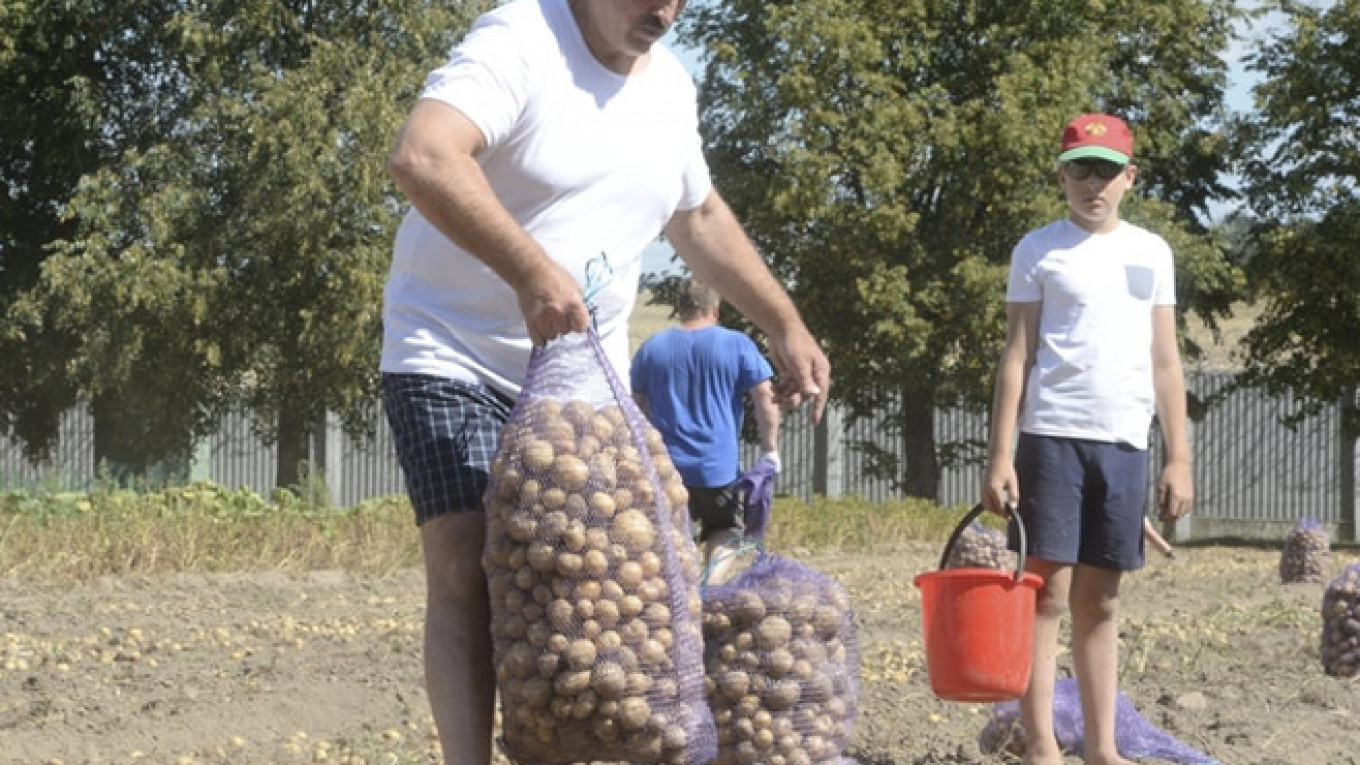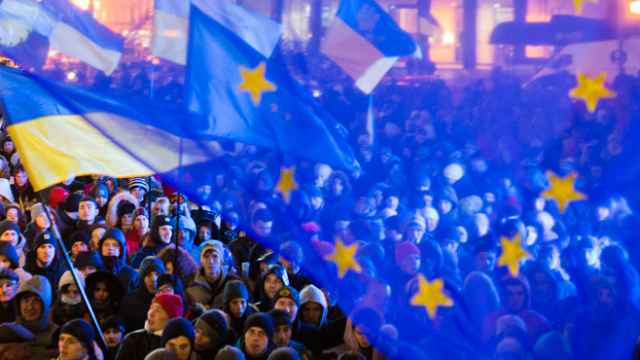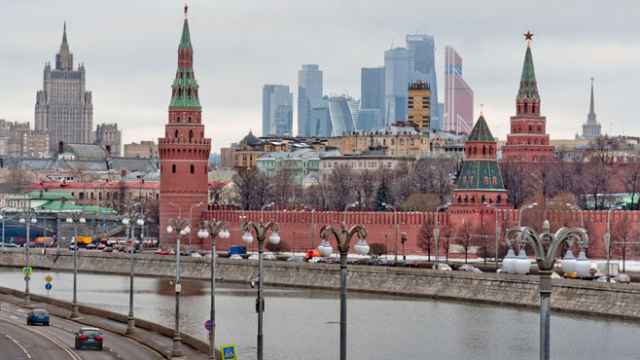Belarus has taken many dubious and even strange steps in recent years that Russia has dutifully emulated like a devoted pupil. Belarus, one of the most industrialized republics of the Soviet Union, was hard hit by the country's collapse. Its economy contracted by more than 35 percent from 1990 to 1994 and inflation during the first three years of independence averaged more than 1,500 percent annually.
The young populist, Alexander Lukashenko, exploited that situation by coming to power in 1994 with slogans of "restoring order" and "reopening factories." Prior to his election, Belarus was a relatively democratic country with more than 40 political parties, a legally registered radical opposition and emerging free market institutions. The election of the new president marked a downward turning point in Belarussian history.
A little less than a year after winning the elections, Lukashenko used a national referendum to restore the flag and emblem of Soviet Belarus and soon embarked on resurrecting the Soviet order.
Starting in 1995, conditions worsened for political activity. The number of parties fell from 43 to 15 in 2014, of which only seven were oppositional. A crackdown began against the most outspoken critics of the ruling authorities.
Local governments were reformed in 1996 with the result that municipalities now elect Councils that, along with the entire executive branch of government, answer directly to the president.
Leaders replaced the Supreme Soviet with the National Assembly in 1996. All of the deputies in the lower chamber of that body who were elected in 2004 were on the so-called "Lukashenko's list." The Belarussian authorities also passed laws curtailing the rights of the media in January 1995, requiring official permission for rallies and demonstrations and making it a criminal offense for civic organizations to receive funding from foreign donors (2011). Russia introduced similar measures from three to seven years later.
Of course, Belarus has introduced several "innovations" that Moscow has yet to emulate: from laws punishing vagrancy (April 2015) to prohibitions against storing more than 15 liters of beverages containing alcohol and 5 liters of alcohol on which excise fees have not been paid (May 2015) in a private apartment.
Naturally, Lukashenko has "reordered" Belarussian politics so as to retain his hold on power indefinitely. He held a referendum in 1996 to significantly expand the powers of the executive branch and extend the term of the president, and in 2004, in violation of Belarussian law, held another referendum limiting the number of consecutive terms the president could serve. Just the same, Lukashenko was elected to his third presidential term in 2006, to his fourth in 2010 and is now preparing for his fifth election.
Of course, a "centralized" political system precludes the existence of a free market economy. Foreign investment in Belarus (apart from Russian investment) virtually stopped growing since the mid-2000s. At the start of the global financial crisis, such investment totaled just $878 per capita in Belarus, as compared to $1,800 per capita in Russia. It was much simpler for Minsk than for Moscow to nationalize the economy.
Business interests simply were not fast enough to privatize major Belarussian assets, with the result that the private sector quickly shrank to less than 20 percent of the national economy, as compared to the approximately 60 percent share the private sector holds in Russia.
And despite the fact that Belarus has never been distinguished for its natural resources, it developed on that basis in the 2000s just as Russia did. Belarus gained the opportunity to import oil and gas at Russia's domestic prices, along with the right to process and resale them, generating up to $70 billion in revenues according to some estimates — an amount equal to six annual budgets.
Potash fertilizers also proved an important source of income, as have payments for the transit of Russian oil and gas through pipelines laid in Belarus during Soviet times. Without such resource-related income, Belarus would be just as hopeless as Russia without oil and gas.
Belarus was a pioneer in areas now of concern in Russia such as "import substitution" and methods of "raising" the well-being of the population. Minsk managed to avoid closing all but a very few major industrial plants by providing government subsidies and the classical tools of a planned economy, multiple exchange rates, undervaluation of budget credits and the nationalization of debts.
The Belarussians also outdo their Russian counterparts in introducing de facto regional protectionism and limited domestic competition and, in 2014, sharply increasing tax rates for land and property. Belarus also started much earlier than Russia in creating a system enabling government officials and the president's "family members" to gather "tribute" from major businesses through a complex ownership scheme and whereby the siloviki could run a protection racket and fleece small and medium businesses.
At the same time, "managed" devaluation helps keep Belarussian industry competitive. Although inflation has always been high in Belarus, and averaged 21.2 percent annually from 2001 to 2010, a new tool has been added. As the country's problems mounted, the Belarussian ruble was radically devalued — by 20.5 percent in January 2009 and by more than 50 percent in May 2011.
Those jumps allowed the authorities to formally declare average monthly salaries to have reached the coveted $500 benchmark. And whereas the average monthly salary in Belarus now totals $404, Russia has surpassed its "teacher" with average monthly salaries now totaling approximately $570, down from $694 in 2008.
Of course, the parallels are especially striking in terms of foreign policy generally and relations with the West in particular. Lukashenko was friendly with socialist and authoritarian regimes at a time when Moscow was openly ashamed to flirt with them.
And, of course, Belarus outdoes Russia as a subject of Western sanctions. Europe first lost patience with and imposed sanctions on Belarus in 2010, with the result that 152 Belarusian officials are now prohibited from traveling to the EU, compared with only 84 such Russian officials who face the same restrictions. When calculated as a "travel ban per capita," Russia looks hopelessly far behind Belarus in its rejection of the "decadent" West.
Belarus surpasses Russia not only in the pace with which it passes repressive laws, but also in the scale of its citizens fleeing abroad: 1.3 million Belarussian citizens — at least one-fourth of its labor pool — now work beyond its borders. "The last dictatorship in Europe" can preserve its current form for many more years, but it has no prospects for the future.
Of course, the Russian political elite believe otherwise and scrupulously follow the path that Minsk has pioneered. President Lukashenko might envy President Vladimir Putin for the scale of Russia's wealth and power, but it is obvious that the Russian leader is the disciple and follower, and not vice versa.
Vladislav Inozemtsev is director of the Moscow-based Center for Post-Industrial Studies and is currently the Berthold Beitz Fellow with the German Council on Foreign Relations (DGAP). This comment originally appeared in Vedomosti.
A Message from The Moscow Times:
Dear readers,
We are facing unprecedented challenges. Russia's Prosecutor General's Office has designated The Moscow Times as an "undesirable" organization, criminalizing our work and putting our staff at risk of prosecution. This follows our earlier unjust labeling as a "foreign agent."
These actions are direct attempts to silence independent journalism in Russia. The authorities claim our work "discredits the decisions of the Russian leadership." We see things differently: we strive to provide accurate, unbiased reporting on Russia.
We, the journalists of The Moscow Times, refuse to be silenced. But to continue our work, we need your help.
Your support, no matter how small, makes a world of difference. If you can, please support us monthly starting from just $2. It's quick to set up, and every contribution makes a significant impact.
By supporting The Moscow Times, you're defending open, independent journalism in the face of repression. Thank you for standing with us.
Remind me later.








